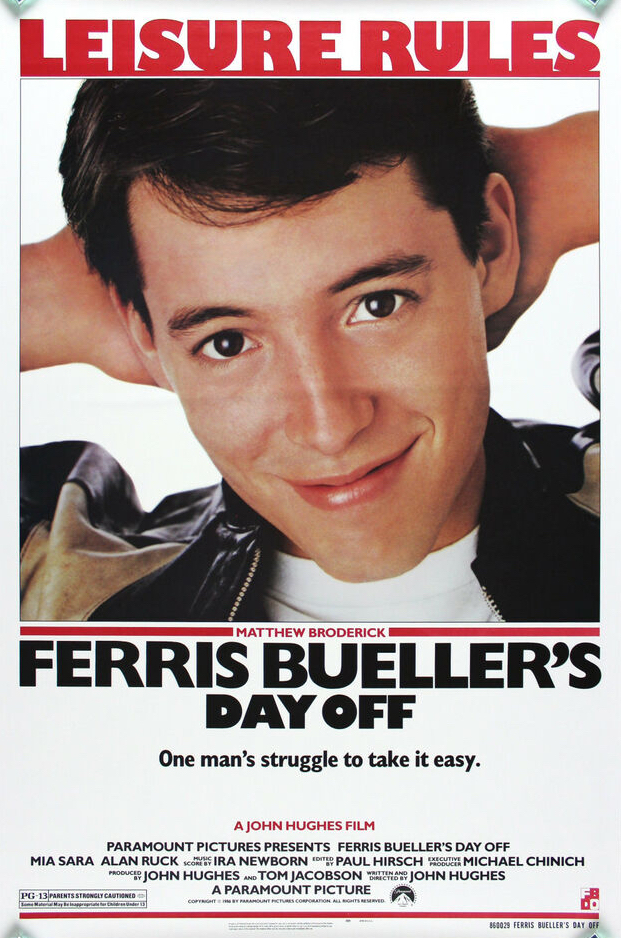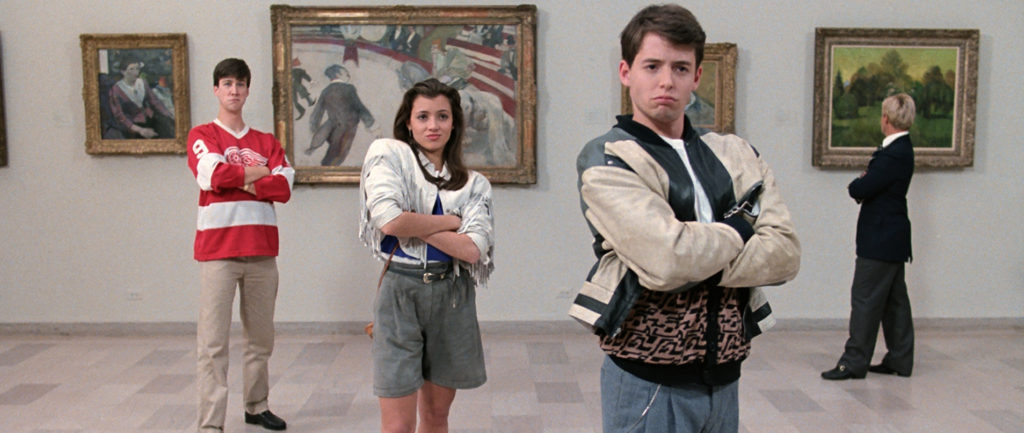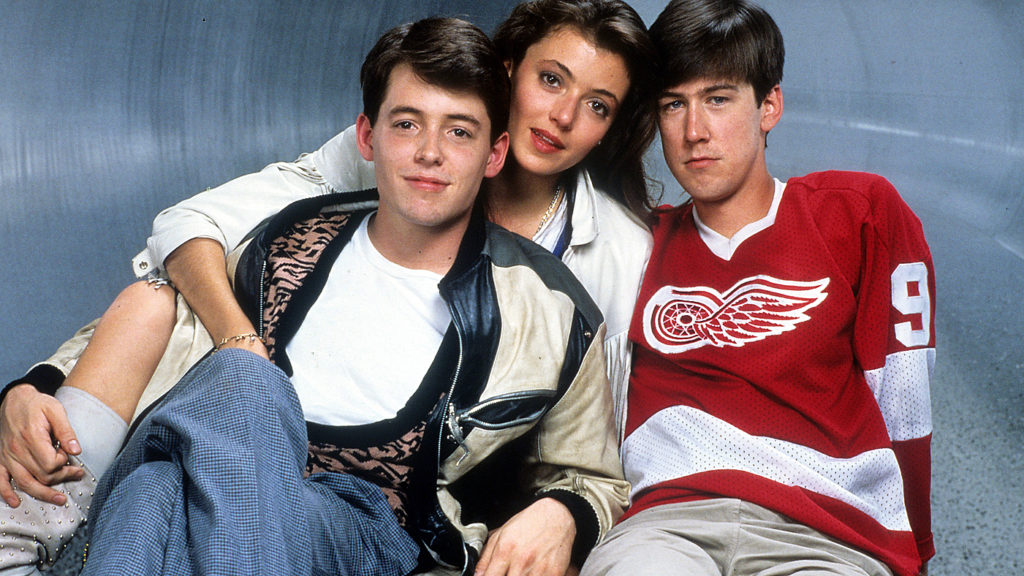Week of April 12 – 18, 2020
This movie struck me as an obvious choice as soon as I conceived the idea for this category. I like The Breakfast Club a little more in the John Hughes oeuvre, but Ferris Bueller’s Day Off is such a pure celebration of life that it has to be included in a survey such as this.

Oh, but to be able to glide through life with the ease of Ferris Bueller. The genius of this movie is that popular Ferris (Matthew Broderick, in perhaps his signature role), neither a jock, a brain or a rebel (to use the male terms from The Breakfast Club), is so likable as to offset all the angst and agitation his hooky day causes.
I should think that most viewers are familiar with Ferris’s adventurous day of skipping high school. The bedroom ruse to fool his parents; convincing his friend Cameron (Alan Ruck) to go with him; the phone call to principal Ed Rooney (Jeffrey Jones, in his signature role) to get his girlfriend Sloane (Mia Sara) out of school; the adventure in Chicago; the trip home and then trying to fix things so no one knows they’ve been gone. It’s really quite a lively day, definitely more than three people could conceivably enjoy in just one short time span.
Consider the Chicago adventure. Ferris, Cameron and Sloane visit the Sears Tower (now the Willets Tower), attend a Cubs game at Wrigley Field, tour the Art Institute, visit the Chicago Mercantile Exchange, jump into a mid-town parade (where Ferris famously lip-syncs and gyrates to two songs on top of a float) and then enjoy dinner at a Rush Street restaurant. I used to live in the Chicago area and I couldn’t do all that in one day. Yet Ferris and his friends have a high old time enjoying all that the Windy City has to offer and still have time to get home before his parents can check on him.
The Chicago adventure is great fun, with a couple of standout highlights. One of them is the Art Institute visit, which is photographed with ingenious artistry. That sequence actually makes going to an art gallery seem like fun, like an experience that is challenging and yet fulfilling. (As you can tell, I’m not an art guy). And then the parade, the Von Steuben Day parade, where Ferris hops up on a float and pretends to sing “Danke Schoen” and “Twist and Shout.” This scene is now an indelible image of Chicago cinema.

Yet, as enjoyable as the Chicago adventure is — and I love the city — I feel that the best part of the story occurs afterward. During their absence, principal Rooney has tried to prove that Ferris is not home, encountering both the family dog and Ferris’s sister Jeanie (Jennifer Grey) as he prowls around. Cameron has discovered that the odometer on his father’s Ferrari that they “borrowed” has 300 unexplained miles on it — which Ferris thinks he can reverse. And that doesn’t go so well.
Jeanie is unhappy with her place in the family tree; it is obvious their parents dote on Ferris but don’t know how to show affection to her. After her run-in with Rooney, the police take her into custody for reporting a false report. At the station, waiting for her mother to collect her, Jeanie meets a local hood (Charlie Sheen) who listens to her bitching and gives her some sage advice. They are making out by the time Mom (Cindy Pickett) arrives. Driving home, Jeanie spots Ferris on his way home, too, but speeds and gets a traffic ticket. When she arrives home, however, the principal is there, ready to claim victory by capturing Ferris in the act; but it is Jeanie who saves the day. Ferris escapes yet again.
All the stuff that surrounds the Chicago adventure is character-driven comic absurdity that I find irresistible, from Cameron’s Eeyore-like pessimism about his father’s reaction to the car, to Jeanie’s turnabout regarding her brother. Minor characters get great lines or sight gags, such as Rooney’s secretary Grace (the marvelous Edie McClurg) to the two garage attendants who get their chance to pilot a Ferrari. School kids worried about Ferris actively try to collect money to get him a new kidney! Rooney suffers proper indignities, and his final bus ride back to school is simply marvelous.

Finally, the other fantastic element is how writer-director Hughes actively breaks down the “fourth wall” in this story. Not being satisfied with merely serving up a funny, surprisingly meaningful treatise about enjoying life before it passes one by, Hughes allows Ferris to directly address viewers throughout the film. He tells us about Cameron’s tightly wound personality, about his own home life, and exhorts us to take some time away from our business, too. It’s the perfect use of a technique that I am not very fond of, but which when done with style, can humanize the proceedings immensely.
And then there’s the magnificent post-credits moment when Ferris, emerging from the bathroom, tells us that the movie is over, and it is time to go home. I howled when I first saw that, and as the manager of the York Theatre at the time, urged my audiences to stick around to enjoy that wonderful moment for themselves. We played three straight movies made in Chicago that fall: this one, Running Scared, and Nothing in Common. With the additions of Raw Deal and About Last Night . . ., it is easy to see that filmmaking in Chicago was at a pinnacle in 1986.
Anyway, watching the ebullient comedy Ferris Bueller’s Day Off is the perfect antidote to the stay-at-home blues. Enjoy the way Ferris and his friends outfox principal Rooney, and try to figure out just why everyone roots for Ferris. Is the whole adventure just a figment of Cameron’s overactive imagination, as some people have postulated? And what do you think would happen to these characters in the future? It’s all part of the Ferris Bueller mystique. I still like The Breakfast Club as a deeper delve into the secret lives of teenagers, but this movie is certainly funnier and more exuberant. It’s a wonderful movie. ☆ ☆ ☆ 1/2. Backdated to April 12, 2020.
Similar movies include National Lampoon’s Animal House (1978); Mr. Mom (1983); Sixteen Candles (1984); The Breakfast Club (1985); Weird Science (1985); Pretty in Pink (1986); and Some Kind of Wonderful (1987).
